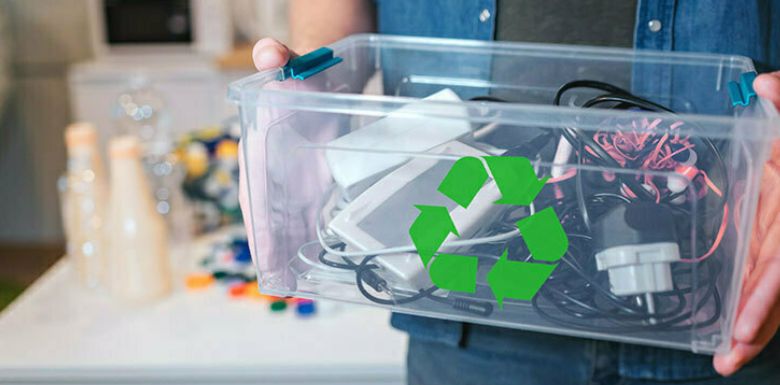How to make your business more sustainable
 In this article
In this article
- Review your greenhouse gas emissions
- Boost your property’s energy efficiency
- Reuse and recycle
- Limit waste (and save money in the process)
- Consider more efficient modern equipment
- Switch to electric vehicles
- Use sustainable companies and products
- Encourage employees to make changes
- Get help becoming sustainable
- Top tips to recycle more
Nowadays, business sustainability is no longer a ‘nice-to-have’ option in your business plan; it’s an essential element of a business’s structure - one that can improve both the image of your business and help you save money on core business overheads.
Whether it’s switching to using electric vehicles on a permanent basis, or going all-in on the recycling side of things, there are plenty of ways to improve business sustainability – but you might not know where to start.
Start by reviewing your greenhouse gas emissions
When it comes to the question of how a business can be sustainable, the first step is to get a better understanding of what your business’s emissions are currently. This is much easier to do than you might think.
For example, there is advice on the government website on how to gather the information and data you need, as well as tips on how to set your reduction targets and what sorts of savings you could make.
Look for ways to boost workplace energy efficiency
Whether you have dedicated business premises or work from home, have a look at any changes you could make for your property to become more energy efficient.
Relatively simple and inexpensive improvements include:
- Door insulation One of the biggest causes of heat loss in any building is poor insulation, particularly around doors. If you can feel cold air coming from under an external door or around its edges, look to seal its frame or fit a weather bar/door brush strip across the base to prevent warm air escaping.
- Window insulation Another common source of drafts in buildings, but with a little foam sealant, your windows should keep the heat in.
- Double-glazing A must for modern windows, double- or even triple-glazed windows are fantastic at heat retention, boosting overall energy efficiency and reducing drafts.
- Wall and floor insulation Proper floor and wall insulation can go a long way towards further improving the energy efficiency of your business. If you own the property, you may be able to access government grants and funding to offset the cost.
- Smart power systems Even if you’re not directly using a device, you could be using power just by having it plugged in. Use smart power systems and strips to cut off power to devices that are plugged in but not in use.
Reuse and recycle
A good first step in cutting the carbon footprint of your business waste is to have recycling bins in your office to make it easy for you and your employees to dispose of waste responsibly.
You could also consider what you can do to support and encourage your customers to recycle any of your products and packaging that they use, for example by improving labelling on what can be recycled and how to recycle it.
Recycling is one of the simplest ways to make your business more sustainable, but if you want to streamline the process even further, then we recommend doing the following as well:
- Carry out a waste audit to see how much recyclable waste your business is producing.
- Keep records of your waste disposal so you can monitor the amount you’re recycling.
- Nominate a waste champion to take leadership of any recycling issues around your business.
- Communicate with your staff about how best to recycle and make sure everyone knows what recycling facilities are available in your place of work.
- Swap traditional plastics and packaging for biodegradable alternatives where possible.
Limit business waste
No matter how small or insignificant it may seem, every item thrown away increases your carbon footprint. And while recycling helps reduce this, it’s often much better to cut down on how much waste you produce to begin with – both for business sustainability and your wallet.
Ditching single-use plastics, minimising the volume of packing you use for your products and only buying what supplies you actually need for your business can go a long way towards cutting back on waste.
Which? Trusted Trader JR Roofing has benefited hugely from its waste reductions. Director Josh Morrison says his company now separates all waste and recycles where possible, changing suppliers to help facilitate this and buying supplies in bulk to reduce the level of packaging.
In addition, the company has eliminated all paperwork internally and uses postcode data to plan visits, helping to reduce travel and substantially reducing business admin time by going entirely digital.
Invest in modern equipment
While you might have all the tools you need to do your job, investing in more modern equipment can often be a good solution for reducing your carbon footprint and improving the efficiency of business operations.
When carpet and upholstery cleaner Proclene upgraded its machines, its new models use 40% less water and fuel emissions were reduced by 23%. The time it takes to carry out a thorough carpet clean was also reduced by 30%.
Director Craig Haycock says: “We’ve switched out many of the cleaning products we use in the services we provide to more ethical, sustainable, ecological and environmentally friendly products, and we will continue looking for ways to swap out the rest until they all are.’
Switch to electric vehicles (EVs)
According to figures from the Society of Motoring Manufacturers and Traders (SMMT), published by EV chargepoint mapping app Zap-Map, there are now more than 680,000 electric cars on our roads, with the number of EVs predicted to rise to more than 12 million in just over eight years.
In other words, there’s never been a better time to invest in electric work vehicles.
Many businesses have already made the switch, thanks to new government incentives helping small and medium-sized enterprises (SMEs) handle the upfront costs.
In fact, the Department of Transport has put together a beginner’s guide for switching to electric vehicles to help you better understand the process, and the government has even launched an app called EV8 Switch, which calculates if drivers could save money by switching to an EV compared with their current petrol or diesel vehicle.
Use sustainable companies and products
When purchasing a sustainable product, you should consider the product itself as well as the process by which it was created.
Look for products that:
- Use fewer natural resources
- Contain fewer hazardous materials
- Have a longer lifespan
- Consume less energy or water in production or use
- Can be reused or recycled.
However, business sustainability is not just about buying ‘green’ products; it’s also about minimising the negative social and economic effects of your purchasing decisions. In light of this, it’s always worth considering the following when sourcing new products:
- Whether they’re ethically sourced from companies that adhere to a decent minimum labour standard during production.
- Choosing goods that are created and supplied locally, benefiting the local job sector and minimising travel costs.
- Utilising products and services from the community and voluntary sectors.
- Choosing companies with a good employment ethic – for example, those that offer opportunities for training and skills development or apprenticeships.
Encourage employees to make changes
Finally, when it comes to the core question of ‘How can businesses be more sustainable’, invoking real change often starts by changing your and your employees’ attitudes towards the environment.
If you haven’t done so already, talk to your employees about how they’d like to improve the environmental standards of the business, while also offering incentives for taking more green action.
While we touched briefly on this earlier, it’s worth mentioning that there are plenty of government schemes and grants out there that you can make use of to help your business save money during its sustainability transition. We’d recommend going with the following to get started:
The Workplace Charging Scheme
The Workplace Charging Scheme (WCS) is a voucher-based scheme that provides eligible applicants with support towards the upfront costs of the purchase and installation of EV charge points.
It’s open to businesses, charities and public sector organisations that meet the applicant and eligibility criteria and is available in England, Wales, Scotland and Northern Ireland.
The grant covers up to 75% of the total costs of the purchase and installation of EV chargepoints (inclusive of VAT), capped at a maximum of £350 per socket and 40 sockets across all sites per applicant.
The plug-in car grant
Businesses can get a discount on the cost of a brand new low-emission vehicle through the government's plug-in car grant if you’re buying from a vehicle dealership or manufacturer.
To be eligible for the grant, the car must have a recommended retail price (RRP) of less than £32,000, including VAT and delivery fees, a zero-emission range of at least 70 miles and be fully zero-emission.
The grant will pay for 35% of the purchase price for these vehicles, up to a maximum of £1,500 for cars, £2,500 for small vans and £5,000 for large vans. Check the criteria for low-emission vehicles eligible for a plug-in grant.
Cycle to work scheme
This government-backed scheme encourages employees to cycle to work by offering savings on bikes and accessories.
The business will pay for an employee’s bike in the first instance and then collect monthly payments to come tax-efficiently from the employee’s salary.
Employers recoup the full cost of the bike and are able to save on employer NICs at 13.8%. Take a look at the government website for further guidance on how the Cycle to work scheme works, as well as the benefits to employees and employers.
Get help becoming sustainable
Join the ‘race to zero’ campaign
As part of its COP26 Presidency Programme and beyond, the government is supporting all businesses who sign up to the globally recognised United Nations Race to Zero campaign.
This helps organisations become more energy efficient, switch to electric vehicles, and reduce landfill to zero.
Join the UK Business Climate Hub
Launched in May 2021, the UK Business Climate Hub encourages small businesses to go green. These actions are supported by the government’s Together for Our Planet campaign, where businesses can get advice and support and commit to becoming net zero in the future.
So far, the campaign has helped drive 3,894 sign-ups to the UK Business Climate Hub website, representing 80% of sign-ups worldwide, and played a critical role in encouraging more than half of the country’s largest businesses to make climate change commitments during COP26 in late 2021.
Show your credentials as a Trusted Trader
With all those key points covered, you should hopefully now have a much better idea of how to improve the sustainability of your business in the future and what you can start doing now to be a more environmentally responsible business going forward.
Of course, becoming more sustainable is also a great way to attract more customers to your business, as is becoming a Which? Trusted Trader.
By signing up to the Trusted Trader scheme, you’ll be showing customers that you’re a reputable Which? approved business. Not only that, but Trusted Traders also get access to their own business page to display reviews, previous work, and their sustainability ambitions.
Get in touch with our team today to learn more and ask about our vetting process. And don't forget to visit our trading hub as well for more guides like this one.
Become a Trusted Trader
When customers see you displaying our logo, they'll know you're a trader they can trust
Find out more




